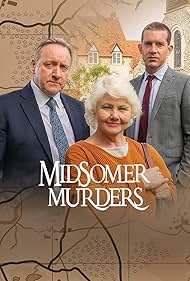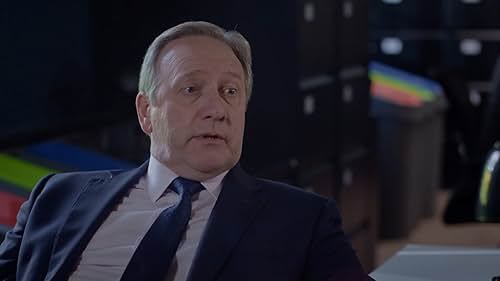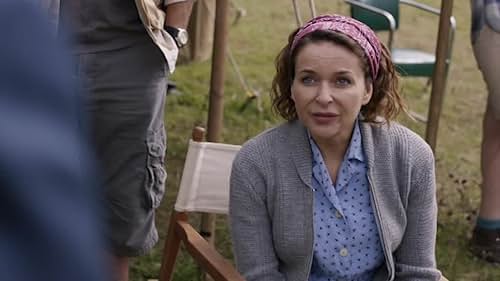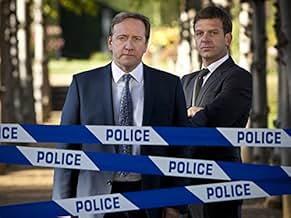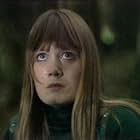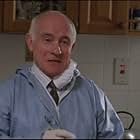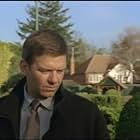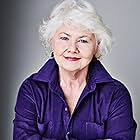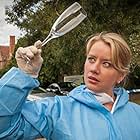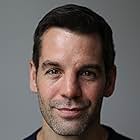Un ex ispettore capo e il suo giovane sergente indagano sugli omicidi intorno alla comunità regionale della contea di Midsomer.Un ex ispettore capo e il suo giovane sergente indagano sugli omicidi intorno alla comunità regionale della contea di Midsomer.Un ex ispettore capo e il suo giovane sergente indagano sugli omicidi intorno alla comunità regionale della contea di Midsomer.
- Premi
- 1 vittoria e 10 candidature
Sfoglia gli episodi
Trama
Lo sapevi?
- QuizThe solo instrument that produces the melody in the title music is a theremin. It was invented by Russian scientist Leon Theremin, and was first demonstrated in 1920. It predates the modern synthesizer by about forty years, but its uniqueness stems from the fact that it is the only instrument that is played without actually being touched. Its electronic circuits are controlled by two antennas, left and right of the instrument, toward which the player moves his or her hands. The closer the right hand to one antenna, the higher the pitch. Similarly the proximity of the left hand to the other antenna controls the volume. The theremin has a range well in excess of eight octaves, and is capable of all kinds of strange effects. These sounds, perhaps most famously heard as the lead instrument of the long-running "Doctor Who" series, have also been put to use in other science fiction and movies, including Sir Alfred Hitchcock's Io ti salverò (1945) and Robert Wise's Ultimatum alla Terra (1951). This unique instrument has also been used on The Beach Boys' song "Good Vibrations". The late Clara Rockmore was the theremin's greatest virtuoso, and the instrument and its inventor were profiled in the documentary Theremin: An Electronic Odyssey (1993).
- Citazioni
DCI Tom Barnaby: [Last line spoken by Tom Barnaby] What now? I'm going to have my cake and eat it.
- ConnessioniEdited into Map of Midsomer Murders (2008)
Recensione in evidenza
I've been binge-watching (unintentionally--I accidentally got hooked) on N*tfl*x and am now on season 12. My appreciation for this show has only grown; which leads me to substantially increase my rating from the first season or two. FYI: yes, while thankfully not too hard to understand here, there is closed-captioning.
Why I've grown to like this show so much: While the initial season or two were rife with annoying stereotypes, as the show matured, so did the characters. Barnaby, the lead, is a nice change from the sometimes deranged, immature and annoying detectives so popular on American television today. He's a laid back intelligent fellow, with a stable marriage and a lovely grown daughter with ambitions of her own. It's also a nice change for a detective show to not rely on any ongoing marital or family strife as a prop for ramping up tension and drama. Any marital spats here are realistically mild and short-lived (except for the first season or so, when Joyce (his charmingly age-appropriate wife) too often complains about his frequent and justified absences during "family" moments--that was irritating, as any cop's spouse--or doctor's spouse, or fireman's spouse, would know that is part of the job; especially in a rural district with low staff numbers. I realize I'm over thinking this, but I'm glad they dropped that trope relatively early, regardless). As of season 12 Joyce is secure in her relationship with Barnaby and a woman with an active life outside of her marriage. This is a healthy relationship with mutual support and affection. Such a nice change from the usual. His "sidekicks" have also matured and grown more believable.
Even better, the show has improved the mysteries and interjected a bit more dry and appropriate humor. The Barnaby of season 12 is a confident and relaxed, seasoned detective. Sure of himself and his team(unlike many shows of this ilk); willing to let others do the heavy lifting--far more realistic than an older lead detective charging off after a younger suspect--and even let someone else take the lead. By season 12 Barnaby is secure in his position and has nothing to prove to his superiors; he's good at his job without being a rigid moralistic crusader, and everyone knows it. Despite the fact that he despises office politics, he's an active part of a functioning team, and the other characters are also allowed to change, grow and mature, with character arcs that realistically portray their growing knowledge and confidence--and promotions.
Another thing I really like about the program (and for me a major point of appreciation for British programming in general) is that many of the characters are middle aged or elderly. The cast is composed of actors and actresses that look age-appropriate and like real people. These are not Hollywood plasticized, Botoxed and sanitized versions of the middle-aged or elderly. Victims and villains, and even those having romantic affairs look like ordinary people-in some cases very attractive ordinary people, but people with prominent laugh lines and even (gasp) gray hair. People with character. Senior citizens are actively having love affairs and sexual encounters and no one is acting shocked at their age (except perhaps a spouse or two, or maybe their grandchildren); and the writers don't treat it like a joke.
This show rarely makes any note about how old anyone is when they are getting up to whatever they are doing--except perhaps in admiration. What a breathe of fresh air! You do not have to suspend disbelief to accept that actor as the father of that middle aged child, or that one as the middle aged parent of that teenager, or that those people are actually married to each other and have been for 30 or 40 years, or that person was active in WWII, etc. Given some of the mysteries go back to something that happened decades or even generations before, casting age-appropriate actors matters a great deal, even if it didn't seem like an obvious thing to do anyway. (On a social level, it also demonstrates a much greater acceptance of aging and flaws in appearance. You can be attractive even with wrinkles and a saggy bum. An attitude we'd do well to emulate). Midsomer's murder demographic definitely skews older than we would assume from similar American programming. I like that very much.
Overall a very enjoyable program with interesting and believable characters (if you can get past the first season or so) and great actors. Usually not the most challenging of mysteries, but entertaining. The quality or challenge of those mysteries can vary. In general the audience is given the same knowledge as the Detectives, so in that regard there are few "cheats" (I can't stand mystery shows that cheat their audiences; leaving out crucial information that only the sleuth knows). Most of the time the Detectives spell out their logic (sometimes as the show progresses, but usually at the end) in figuring out the murderer's identity and/or the murderer's motive. Once we know the facts and follow the Detective's logic, it makes sense--if you haven't already solved the mystery on your own.
Why I've grown to like this show so much: While the initial season or two were rife with annoying stereotypes, as the show matured, so did the characters. Barnaby, the lead, is a nice change from the sometimes deranged, immature and annoying detectives so popular on American television today. He's a laid back intelligent fellow, with a stable marriage and a lovely grown daughter with ambitions of her own. It's also a nice change for a detective show to not rely on any ongoing marital or family strife as a prop for ramping up tension and drama. Any marital spats here are realistically mild and short-lived (except for the first season or so, when Joyce (his charmingly age-appropriate wife) too often complains about his frequent and justified absences during "family" moments--that was irritating, as any cop's spouse--or doctor's spouse, or fireman's spouse, would know that is part of the job; especially in a rural district with low staff numbers. I realize I'm over thinking this, but I'm glad they dropped that trope relatively early, regardless). As of season 12 Joyce is secure in her relationship with Barnaby and a woman with an active life outside of her marriage. This is a healthy relationship with mutual support and affection. Such a nice change from the usual. His "sidekicks" have also matured and grown more believable.
Even better, the show has improved the mysteries and interjected a bit more dry and appropriate humor. The Barnaby of season 12 is a confident and relaxed, seasoned detective. Sure of himself and his team(unlike many shows of this ilk); willing to let others do the heavy lifting--far more realistic than an older lead detective charging off after a younger suspect--and even let someone else take the lead. By season 12 Barnaby is secure in his position and has nothing to prove to his superiors; he's good at his job without being a rigid moralistic crusader, and everyone knows it. Despite the fact that he despises office politics, he's an active part of a functioning team, and the other characters are also allowed to change, grow and mature, with character arcs that realistically portray their growing knowledge and confidence--and promotions.
Another thing I really like about the program (and for me a major point of appreciation for British programming in general) is that many of the characters are middle aged or elderly. The cast is composed of actors and actresses that look age-appropriate and like real people. These are not Hollywood plasticized, Botoxed and sanitized versions of the middle-aged or elderly. Victims and villains, and even those having romantic affairs look like ordinary people-in some cases very attractive ordinary people, but people with prominent laugh lines and even (gasp) gray hair. People with character. Senior citizens are actively having love affairs and sexual encounters and no one is acting shocked at their age (except perhaps a spouse or two, or maybe their grandchildren); and the writers don't treat it like a joke.
This show rarely makes any note about how old anyone is when they are getting up to whatever they are doing--except perhaps in admiration. What a breathe of fresh air! You do not have to suspend disbelief to accept that actor as the father of that middle aged child, or that one as the middle aged parent of that teenager, or that those people are actually married to each other and have been for 30 or 40 years, or that person was active in WWII, etc. Given some of the mysteries go back to something that happened decades or even generations before, casting age-appropriate actors matters a great deal, even if it didn't seem like an obvious thing to do anyway. (On a social level, it also demonstrates a much greater acceptance of aging and flaws in appearance. You can be attractive even with wrinkles and a saggy bum. An attitude we'd do well to emulate). Midsomer's murder demographic definitely skews older than we would assume from similar American programming. I like that very much.
Overall a very enjoyable program with interesting and believable characters (if you can get past the first season or so) and great actors. Usually not the most challenging of mysteries, but entertaining. The quality or challenge of those mysteries can vary. In general the audience is given the same knowledge as the Detectives, so in that regard there are few "cheats" (I can't stand mystery shows that cheat their audiences; leaving out crucial information that only the sleuth knows). Most of the time the Detectives spell out their logic (sometimes as the show progresses, but usually at the end) in figuring out the murderer's identity and/or the murderer's motive. Once we know the facts and follow the Detective's logic, it makes sense--if you haven't already solved the mystery on your own.
- ladybug2535
- 5 mag 2016
- Permalink
I più visti
Accedi per valutare e creare un elenco di titoli salvati per ottenere consigli personalizzati
Dettagli
Contribuisci a questa pagina
Suggerisci una modifica o aggiungi i contenuti mancanti
